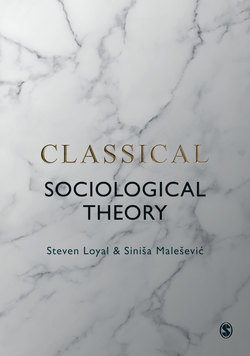Читать книгу Classical Sociological Theory - Sinisa Malesevic - Страница 25
На сайте Литреса книга снята с продажи.
Arguments and Ideas Metaphysics
ОглавлениеIn his Metaphysics Aristotle, as we have noted above, criticised Plato’s Theory of Forms from an empirical perspective. The form of a thing was not just a sum of the physical characteristics pertaining to it, but also included what it did – its function (ergo). By studying and observing specific plants and animals in nature, Aristotle developed a more rounded picture of what makes them similar and different to other plants or animals. Such a comparative method points towards empiricism – knowledge depends upon what we can see.
Just as a craftworker gives a piece of wood form by making a table according to a plan, or an aim or end, so too does nature work according to a plan or end. Aristotle posits, however, a fundamental difference between the change in artificial objects, which comes from outside the objects themselves, and the change in nature, which comes from within. Nature (phusis) not only is complex and highly efficient, but also works towards an end, that is towards a purpose or telos. For example, an acorn has a natural and constant tendency to become an oak, a lamb to become a sheep, a puppy to become a dog. In each case what is actual – a puppy – will change according to a inherent potentiality – becoming a dog. All things not only move towards ends but also have a purpose that they are designed to serve. A chair has the purpose to allow us to sit, a cup to drink from, a house to provide shelter. By knowing a thing’s purpose, we can understand it in terms of how good or bad it is in terms of its function – a good chair is comfortable, a bad cup leaks, a warm house provides shelter, etc. This allows us to move from description to making judgements or normative explanation about a thing in terms of its excellence in fulfilling the function for which it was designed.
Teleology – the study of the ends or purpose of a thing or entity – plays a central role in all of Aristotle’s thinking, especially as part of his explanation of causality. Everything in the world is explained by four major causes that account for why a thing exists. These are: (1) the material cause, what a thing is made of; (2) the formal cause, the arrangement or shape of a thing; (3) the efficient cause, how a thing is brought into being; and (4) the final cause, the function or purpose of a thing. In the example of constructing a house, the material cause would be the materials needed to build the house, the formal cause would be the plan or design of the house, the efficient cause would be building the house and the final cause would be to provide shelter or a home to live in.
On the basis of classifying according to observed shared characteristics and marked differences, on what makes a thing unique, Aristotle undertakes a complete classification of things from the simplest organisms to complex human beings, including objects and processes in the world – from literature and poetry to the organisation of states. The essential quality or distinctive function that differentiates humans from plants and makes them unique among animals is the fact that they have reason. That is, they are reasoning creatures for whom rationality underpins their actions. This places them at the top of the animal hierarchy.
